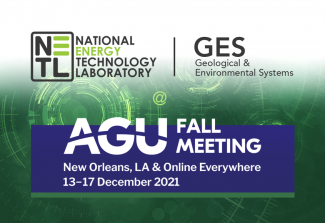Several NETL researchers will present some of the Lab’s recent groundbreaking geological and environmental systems (GES) research during the American Geophysical Union (AGU) Fall Meeting, held in New Orleans, Louisiana, Dec. 13-17.
“As the nation transitions to a clean energy economy, technologies enabling carbon capture and storage (CCS) are becoming even more important,” said Ale Hakala, NETL senior fellow for Geological & Environmental Systems. “An important part of our GES work is making sure that these efforts are safe and reliable.”
Using highly sophisticated tools and facilities at NETL, researchers investigate how underground processes evolve from a geological and geochemical perspective, providing valuable insight for stakeholders involved in carbon storage operations and supporting clean energy for the United States. During the weeklong meeting, NETL researchers will present talks and posters on subjects including carbon storage risk management and monitoring, infrastructure integrity, and fundamental processes in deep geologic reservoirs to better understand the subsurface.
For example, NELT’s Patricia Saint-Vincent will share well finding research during the invited talk, “Well Finding Techniques to Facilitate Methane Emissions Quantification from Abandoned Oil and Gas Infrastructure.”
“Although abandoned oil and gas wells have garnered national attention as emitters of methane, finding and assessing abandoned infrastructure requires intense ground campaigns that can be frustrated by inaccurate well coordinates in state and national databases,” Saint-Vincent said. “We have assessed the feasibility of alternative well finding strategies, including magnetic imaging, light detection and ranging (LIDAR), methane leak detection, and referencing historical maps and documents. A combination of multiple detection strategies is the most useful for locating abandoned wells for emissions quantification and mitigation.”
Other NETL presentations on similar topics will include:
NETL researchers will also highlight the lab’s efforts in geochemistry-based monitoring for CCS in the following presentations:
NETL’s James Gardiner explained, saying “Our research team has created an innovative model that will help protect groundwater in areas that overlie CO2 storage projects. With carbon storage, a primary concern is ensuring that injected CO2 stays within a deep target formation and does not leak to overlying groundwater. Our integrated model incorporates geochemical and statistical tools to detect signals indicative of a CO2 leak. The model, aptly named Geochemically Informed Leak Detection (GILD), will eventually allow users to input collected groundwater data and provide assurance about the safety of their groundwater supply.”
Other presentations will feature offshore risk and spill prevention research and development, which focuses on identifying infrastructure and geohazard-related risks associated with potential offshore-based geologic storage and responsible stewardship of natural resources. These include:
Rounding out the GES-focused presentations for the week are those centered on the topic of “Improved Characterization of Subsurface Geologic Features and Processes.” These research efforts will demonstrate that multi-component approaches are required to better understand heterogeneities in subsurface geologic formations accessed for carbon storage and to sustainably manage subsurface energy resources. Presentations on this topic include:
The AGU Fall Meeting unites more than 25,000 attendees from more than 100 countries in the Earth and space sciences community to share scientific findings and identify innovative solutions.
Register for the event here, and click here for a news story specifically covering NETL’s geoscience and machine learning/artificial intelligence presentations for the AGU Fall Meeting.
NETL is a U.S. Department of Energy national laboratory that drives innovation and delivers technological solutions for an environmentally sustainable and prosperous energy future. By leveraging its world-class talent and research facilities, NETL is ensuring affordable, abundant and reliable energy that drives a robust economy and national security, while developing technologies to manage carbon across the full life cycle, enabling environmental sustainability for all Americans.




